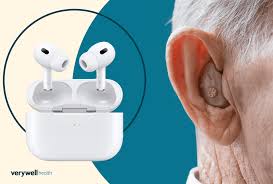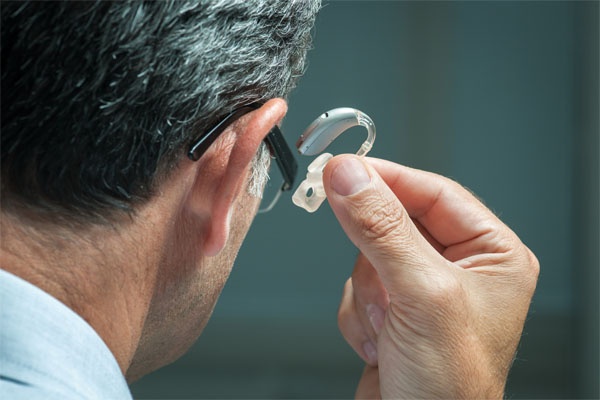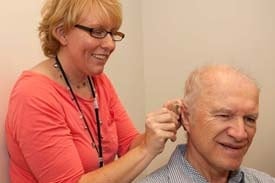Bridgid M. Whitford Au.D, CCC-A

As a Director of Audiology at Cleveland Hearing & Speech Center, I was not surprised when my brother, after reading a Wall Street Journal article, texted me “Are you worried that Apple’s AirPods Pro 2—with their new hearing aid feature—will negatively impact the hearing aid business?”
Read More
Tags:
Hearing Aid,
Communication,
Hard of Hearing,
Deafness

The announcement by the Food and Drug Administration finalizing the ruling that allows for Over-the-Counter (OTC) hearing aid sales is good news for increased access to hearing health care. It will provide increased access to hearing aids for adults (ages 18 and older) who have mild to moderate hearing loss. This can be an initial step to the acceptance and treatment of hearing loss, much like reading glasses for eyesight. OTC hearing aids are not appropriate for children or those with moderate to severe or profound hearing loss.
As an agency with a 101-year history of providing access to hearing health care for all people including marginalized and vulnerable populations, Cleveland Hearing & Speech Center (CHSC) believes this is a step in the right direction for a more global acceptance of the treatment of hearing loss and with Baby Boomers hitting retirement ages, it could not be timelier.
However, at CHSC, we encourage people to undergo an audiologic evaluation (hearing test) before purchasing any hearing aids. A proper diagnosis of the degree of hearing loss results in a more accurately programmed hearing aid – much like a proper prescription for glasses. A hearing evaluation will also identify any underlying medical conditions that may be causing the hearing loss.
CHSC's commitment to hearing health will continue into the next century. We will continue to provide professional audiology services to those who purchase their hearing aids – now including OTC aids - but may find they need additional support.
In addition, CHSC will continue to provide our full range of hearing aid services for all degrees of hearing loss and all ages. Low-cost and no-cost options for hearing aids may include health insurance with hearing aid benefits such as some Medicare Advantage plans, Medicaid, and our Audiology Patient Assistance Program (APA).
Read More
Tags:
Hearing Aid,
Audiology,
Hearing Aids,
Hearing,
Hearing Loss Prevention,
Hard of Hearing,
Hearing Loss,
"ears",
Communication Access,
Medicare
At Cleveland Hearing & Speech Center (CHSC) your hearing health care is of primary importance to us. In addition, we are here to help you investigate your options for any expenses associated with your care. Many insurance plans now cover hearing aids, including some Medicare Advantage plans. These plans may offer hearing aids at low or no cost to you. Traditional Medicare does not provide any hearing aid benefits.
Read More
Tags:
Audiology,
Hearing Aids,
Hearing,
Medicare
For most people, hearing loss occurs very gradually. The process of getting hearing aids, however, is not gradual. You walk into the audiologist's office, and a few minutes later you're hearing! It takes the brain time to get adjusted to the new sounds you'll be hearing through the hearing aids. To make the adjustment process a little easier, start with easy situations and work your way up to more difficult listening environments.
Read More
Tags:
Hearing Aid,
Audiology,
Hearing Aids,
Hearing,
Hard of Hearing,
Hearing Loss
Hearing loss may make conversational speech seem very soft, or may prevent a person from hearing certain speech sounds at all. This is why people with hearing loss often say they can hear people talking, but can’t understand what they’re saying. They may be able to hear some sounds, so they can hear the person’s voice, but the hearing loss is blocking out the sounds that are vital to understanding. Usually, when a person is diagnosed with a hearing loss, hearing aids are recommended. Hearing aids are designed to amplify the sounds that the person needs the most, the sounds that they are unable to hear due to the hearing loss. Unfortunately, hearing aids have limitations and will not restore hearing to normal. Hearing aids are only part of the hearing loss puzzle. The best solution to increase hearing and understanding at the same time is to pair hearing aids with effective communication strategies.
Read More
Tags:
Hearing Aid,
Hearing Aids,
Communication,
Hearing,
Hard of Hearing,
Hearing Loss
When choosing the technology that goes into a hearing aid, you may think the most important consideration is your hearing loss. Although your degree of hearing loss is a significant factor, your lifestyle is also plays a critical role.
Two people can have exactly the same type and degree of hearing loss, but because they live very different lifestyles, an audiologist may not recommend the exact same hearing aid. When deciding which features, or level of technology, are most appropriate for you, consider these factors:
Read More
Cleveland Hearing & Speech Center audiologists are highly trained professionals. We have Doctoral and Master’s degrees in audiology and we have devoted our careers to helping you hear better. At CHSC, We believe that life is improved by successful communication. We are dedicated to helping people hear better so they can fully enjoy the people and activities that bring meaning to each day.
Read More
Tags:
Hearing Aid,
Audiology,
Hearing Aids,
Communication,
Support,
Hard of Hearing,
Hearing Loss
Your Cleveland Hearing & Speech Center (CHSC) audiologist can place an order for your hearing aids. Before you can order a hearing aid, you must have your hearing tested. Once this testing is done, you should talk with your audiologist to decide which hearing aids are best for you, your hearing loss, and your lifestyle. Next, the audiologist will take an impression of your ear. During this process, she will put a putty-like material in your ear for about five to ten minutes. This material will harden to the shape of your ear so the hearing aid company can make your custom hearing aid.
Read More
Tags:
Hearing Aid,
Audiology,
Hearing Aids,
Hearing,
Hearing Loss
As of July 2004, all babies born in the state of Ohio receive a free hearing screening before they go home from the hospital. The Universal Newborn Hearing Screening (UNHS) legislation has been helpful in detecting hearing loss sooner and allowing families to begin helping their babies earlier. Typically, hearing is tested at birth, and, if it’s normal, is not tested again until approaching age 4. This usually takes place on a visit to the pediatrician. Hearing is screened again when the child enters school. Many schools then alternate between vision and hearing screenings during the school-age years.
Read More
Tags:
Speech,
Audiology,
Communication,
Hearing,
Hearing Loss Prevention,
Support

















